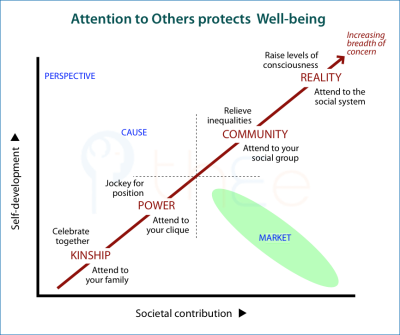Reduce Risks: Attend to Others
Everyone faces risks and should strive to reduce them when seeking benefits. For the Well-Being Set, the risks relate to not noticing dangers to personal and group security. These risks are reduced by giving attention to others. For the , the risks relate to futile effort and unproductive use of valuable resources. These risks are reduced by specialization.
Well-being Set
These mentalities naturally give attention to others to reduce the risk of psychological disruption and to make life a joy rather than a misery. Moving up the diagonal, the necessary span of attention broadens.

- Kinship-centredness demands that all attention and positive support be focused on one’s kin. The greatest danger for any family is the loss of a family member. Any separation is painful. The closer the relationship the greater the concern, but any member of a family, however distant, exerts a natural claim on time and interest. Family members seek opportunities to get together and occasions to celebrate.
-
Power-centredness requires maintenance of status. This entails jockeying for position within your particular party, clique, faction or gang.
The group itself requires constant attention to potential threats from both allies and enemies. It must be defended via loyal support and, if need be, concerted attacks on outsiders.
- Community-centredness spreads attention to a wider group whose members share values in common. Concern for the group is manifested by concern for individual suffering and injustices. Helping or promoting help for the needy is gratifying. Giving practical support is reassuring because it leads to a comforting sense that reciprocation will occur if required.
- Reality-centredness broadens attention still further to include the entire system of communities and societies. The golden rule is unsatisfactory because people and situations vary. So sympathy for others is associated with understanding their nature and of the inevitability of suffering. Efforts to assist take the form of raising the level of consciousness by presenting the truth.
These mentalities do give attention to others of course. But, in all cases, inter-personal attention is geared to productivity, not to maintaining well-being. Obligations to others tend to be avoided or kept impersonal, contractual or part of a given role.
- centred people have networks and form partnerships.
- centred people gather in small cells made up of like-minded others.
- centred people meet at conferences and seminars. Inter-personal concern, if not wholly absent, is minimal and defined by conventions, good manners and expedience.
- Go to the next requirement for success: effective perception.
Originally posted: July 2009